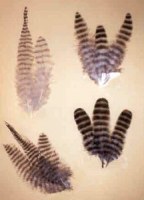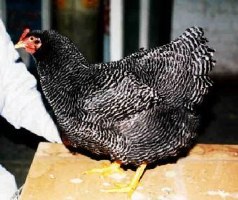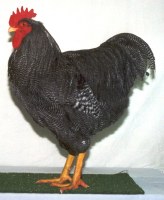Plymouth Rocks

The much awaited Plymouth Rock book, the fifth book in the "Doyens of Poultry" Series is now available. Authorised by well known master of Plymouth Rocks, Les Dowdle. The Plymouth Rock reveals some of the innermost secrets and practices of one of Australia's most respected and knowledgeable poultrymen.
The Plymouth Rock is one of Australia's favourite Heavy Breeds of Fowl along with the Wyandotte, Rhode Island Red and Australorp. It is often termed simply as a Rock by its many admirers. It was named the Plymouth Rock by its founder, Dr J C Bennett, in honour of America's founding pilgrims who disembarked from their vessel The Mayflower at Plymouth Rock.
The striking Barred plumage of black and white stripes is easily recognised by most people who are aware of pure breeds of poultry. One of the most attractive features of the American breeds is their beautiful yellow/orange leg and beak colour. In the Australian Farm Census of 1900 the Plymouth Rock was kept on 60% off all  Australian Farms and was the popular Australian Farm Animal of all time. Even the Merino sheep failed to top that record.
Australian Farms and was the popular Australian Farm Animal of all time. Even the Merino sheep failed to top that record.
 Australian Farms and was the popular Australian Farm Animal of all time. Even the Merino sheep failed to top that record.
Australian Farms and was the popular Australian Farm Animal of all time. Even the Merino sheep failed to top that record.Although a popular exhibition breed it was originally developed as a farmer's fowl suited to ranging widely for its food, producing a good meat supply and a regular supply of large fresh eggs. The shell colour of the Plymouth Rock is an attractive pink colour. There are two different patterns of Barred Plymouth Rocks: The Light Barred and The Dark Barred.

The Dark Barred is generally a little heavier than the Light Barred and is the most commonly exhibited Plymouth Rock. The Light Barred Female is easily the best layer of all the American Breeds recording averages of about 240 eggs per year per bird. For those who require a bird for the table a dressed cockerel will satisfy the hungriest family with a flavour not found in the supermarket or chicken shop.
The breed is hardy and easy to rear with a friendly complacent temperament and is not generally prone to aggressiveness. Newcomers to the breed will be pleasantly surprised with the ease at which they become pets. Those intending to become exhibitors will find they are in for a satisfying and enjoyable past time.
 HERITAGE POULTRY STUD
HERITAGE POULTRY STUD